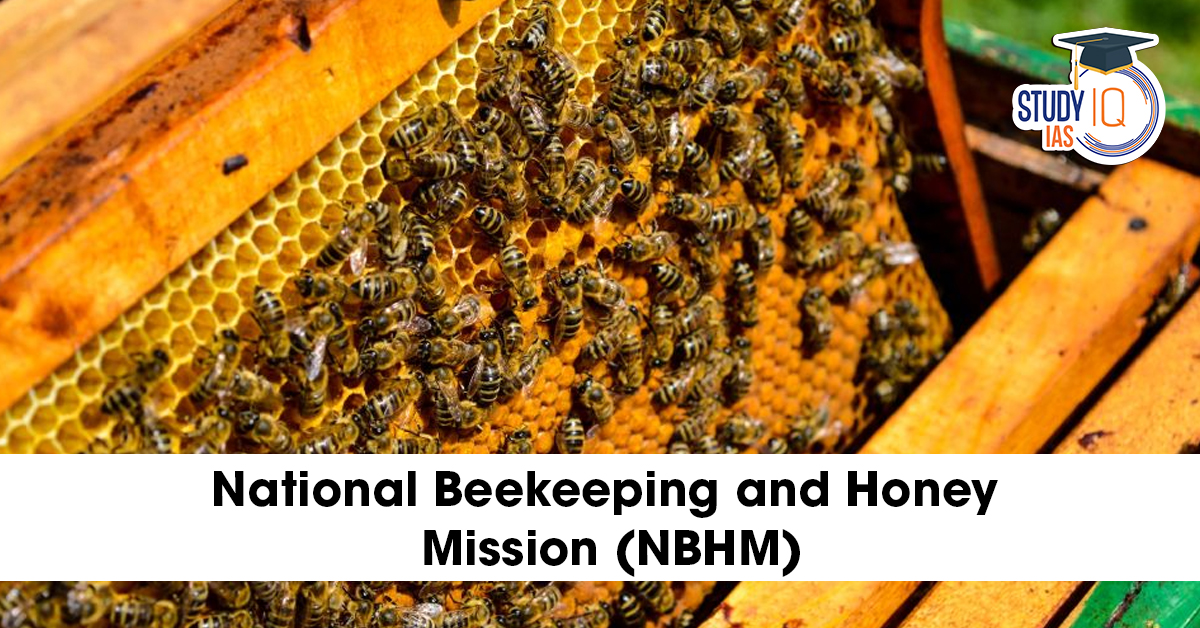Table of Contents
The National Beekeeping and Honey Mission (NBHM) is a Central Sector Scheme launched by the Government of India to promote scientific beekeeping (apiculture) and ensure the holistic development of the beekeeping sector.
This flagship initiative is part of the government’s ambitious “Sweet Revolution”, aimed at boosting honey production, pollination services, and rural livelihoods across the country.
Implemented by the National Bee Board (NBB), NBHM plays a pivotal role in enhancing farmers’ income, agricultural productivity, and exports of natural honey and other bee-based products.
Budget and Implementation Period
-
Scheme Type: Central Sector Scheme
-
Total Outlay: ₹500 crore
-
Implementation Period: FY 2020–21 to FY 2025–26
-
Nodal Agency: National Bee Board (NBB)
Initially announced under the Atmanirbhar Bharat Abhiyan, the mission was extended till 2025–26 with a remaining allocation of ₹370 crore from the original budget.
Why NBHM is Important for India
Beekeeping (apiculture) is more than just producing honey — it’s vital for pollination, biodiversity, and crop productivity.
According to experts, around 80% of crop species rely on pollination by bees and other insects.
Thus, beekeeping directly contributes to:
-
Higher crop yields in fruits, vegetables, oilseeds, and pulses.
-
Additional income for farmers and landless laborers.
-
Employment generation in rural areas.
-
Production of valuable products such as beeswax, royal jelly, propolis, bee venom, and pollen.
With India’s diverse agro-climatic zones, there is tremendous potential to expand beekeeping and honey exports globally.
Objectives of the National Beekeeping and Honey Mission
NBHM’s primary goal is to bring a “Sweet Revolution” through modern, scientific, and sustainable beekeeping.
Key objectives include:
-
Promoting the holistic growth of the beekeeping industry.
-
Enhancing income and employment opportunities for rural and semi-urban communities.
-
Developing infrastructure for honey collection, processing, packaging, and branding.
-
Establishing Quality Control Labs for honey testing across India.
-
Creating a traceability system using the Madhukranti Portal.
-
Empowering women entrepreneurs and Self-Help Groups (SHGs) through beekeeping.
-
Supporting Agri-startups and FPOs engaged in honey production.
-
Promoting exports of Indian honey and bee products to global markets.
Mini Missions under NBHM
The NBHM is divided into three Mini Missions (MMs) for focused implementation:
Mini Mission I – Productivity & Pollination
-
Promotes scientific beekeeping for increasing honey production.
-
Enhances crop productivity through effective pollination services.
Mini Mission II – Post-Harvest Management
-
Focuses on collection, processing, storage, packaging, and marketing of honey.
-
Develops value-added products like flavored and medicinal honey.
Mini Mission III – Research & Technology Generation
-
Encourages R&D on bee health, breeding, and disease management.
-
Promotes region-specific technologies for different climatic conditions.
Achievements and Progress (as of March 2025)
Honey Production & Exports
-
India produced around 1.4 lakh metric tonnes (MT) of natural honey in 2024.
-
Exported 1.07 lakh MT of honey worth USD 177.52 million in FY 2023–24.
-
India is now the 2nd largest exporter of honey globally, up from 9th place in 2020.
Top Export Destinations:
USA, UAE, Saudi Arabia, Qatar, and Libya.
Infrastructure Development
Under the mission, the following have been established or sanctioned:
-
6 World-Class Honey Testing Labs
-
47 Mini Honey Testing Labs
-
6 Disease Diagnostic Labs
-
26 Honey Processing Units
-
18 Branding & Marketing Units
-
10 Cold Storage & Packaging Units
Additionally, 424 hectares have been developed as Technology Demonstration plots, and 288 hectares as bee-friendly flora plantations.
Digital Advancement – Madhukranti Portal
The Madhukranti Portal ensures online registration, traceability, and transparency in honey trade.
As of October 2025, the portal has registered:
-
14,859 Beekeepers
-
269 Beekeeping Societies
-
150 Firms
-
206 Companies
This digital system ensures authenticity, quality assurance, and export credibility for Indian honey.
Empowering Farmers through FPOs
Under NBHM, the formation of 10,000 Farmer Producer Organizations (FPOs) includes 100 FPOs dedicated to beekeeping, implemented through:
-
TRIFED (14 FPOs)
-
NAFED (60 FPOs)
-
NDDB (26 FPOs)
By March 2025, 97 FPOs had already been formed, enabling collective honey production, marketing, and value addition.
Major Honey-Producing States in India
| State | Share in Production (%) |
|---|---|
| Uttar Pradesh | 17% |
| West Bengal | 16% |
| Punjab | 14% |
| Bihar | 12% |
| Rajasthan | 9% |
Minimum Export Price (MEP) Policy
To safeguard Indian honey producers, APEDA introduced a Minimum Export Price (MEP) of USD 2,000 per metric tonne (Rs. 167/kg) for natural honey exports, valid till December 2024.
This ensures fair returns for Indian beekeepers in global markets.
Implementation Mechanism
NBHM’s nationwide structure ensures coordinated execution at every level:
| Level | Key Institutions/Committees | Main Functions |
|---|---|---|
| National Level | Mission/PMU, NBB, Steering & Monitoring Committees | Policy direction, coordination, and project approval |
| State Level | State Level Steering Committee (SLSC) | Implementation and monitoring at state level |
| District Level | District Level Committee (DLC) | Field-level execution and supervision |
| Implementing Agencies | NAFED, NDDB, ICAR, TRIFED, KVIC, SRLM, MSME bodies | Training, R&D, and infrastructure development |
Success Stories from Rural India
1. Nongthymmai Village, Meghalaya
-
Local beekeeper Stevenson Shadap transformed traditional beekeeping into a profitable venture.
-
After training under NBHM programs, he now earns ₹1–2 lakh annually from honey sales.
-
His initiative inspired the formation of a Beekeepers’ Society for collective production and marketing.
2. Kupwara District, Jammu & Kashmir
-
The government established a ₹25 lakh Honey Processing Plant at Gulgam.
-
Local youth Zakir Hussain Bhat expanded from 5 to 200 colonies, now producing 200 quintals of honey annually.
-
Over 500 farmers are now engaged, producing 480 quintals of organic honey, earning ₹3 crore collectively.
-
Plans for GI Tagging of “Kupwara Organic Honey” are underway.
Future Outlook
NBHM is set to revolutionize India’s agriculture ecosystem by integrating pollination with farming and promoting sustainable apiculture practices.
Future goals include:
-
Expanding Honey Corridors across states.
-
Setting up more testing labs and FPOs.
-
Increasing exports and value-added honey products.
-
Empowering rural women and youth entrepreneurs.
Conclusion
The National Beekeeping and Honey Mission (NBHM) stands as a symbol of India’s Sweet Revolution — combining science, sustainability, and entrepreneurship.
By promoting scientific beekeeping, enhancing pollination, and boosting exports, NBHM is not only sweetening India’s economy but also empowering farmers, protecting biodiversity, and strengthening the rural foundation of the nation.


 Particle Therapy Breakthrough: Future of...
Particle Therapy Breakthrough: Future of...
 India’s Space Missions 2026: Chandraya...
India’s Space Missions 2026: Chandraya...
 India–Germany Rare Earth Partnership: ...
India–Germany Rare Earth Partnership: ...

























